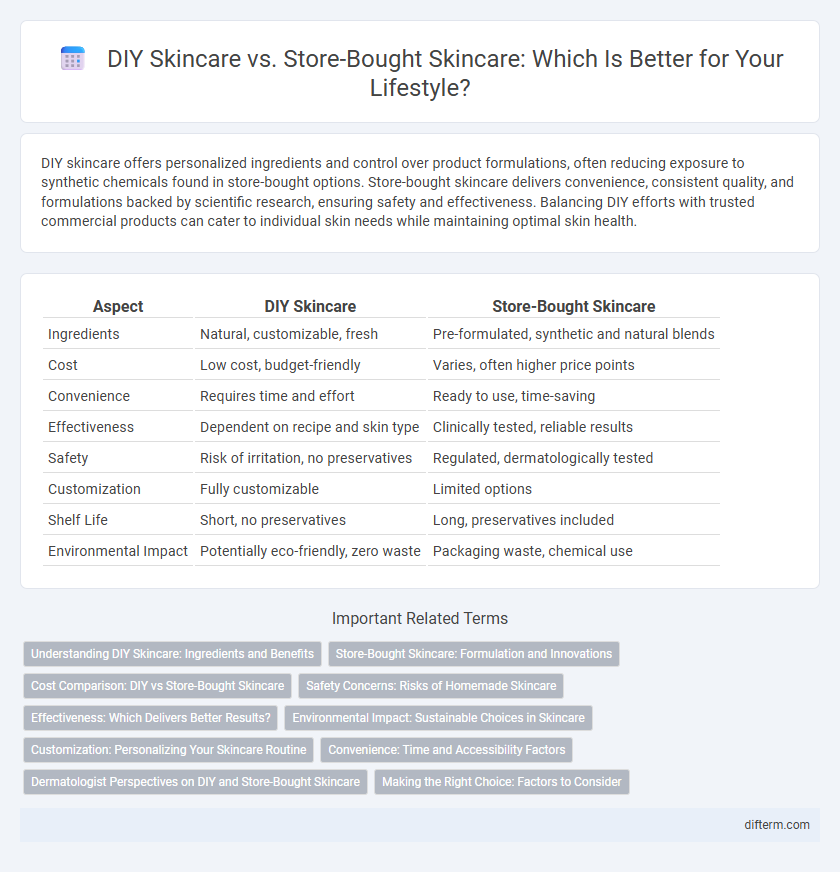DIY skincare offers personalized ingredients and control over product formulations, often reducing exposure to synthetic chemicals found in store-bought options. Store-bought skincare delivers convenience, consistent quality, and formulations backed by scientific research, ensuring safety and effectiveness. Balancing DIY efforts with trusted commercial products can cater to individual skin needs while maintaining optimal skin health.
Table of Comparison
| Aspect | DIY Skincare | Store-Bought Skincare |
|---|---|---|
| Ingredients | Natural, customizable, fresh | Pre-formulated, synthetic and natural blends |
| Cost | Low cost, budget-friendly | Varies, often higher price points |
| Convenience | Requires time and effort | Ready to use, time-saving |
| Effectiveness | Dependent on recipe and skin type | Clinically tested, reliable results |
| Safety | Risk of irritation, no preservatives | Regulated, dermatologically tested |
| Customization | Fully customizable | Limited options |
| Shelf Life | Short, no preservatives | Long, preservatives included |
| Environmental Impact | Potentially eco-friendly, zero waste | Packaging waste, chemical use |
Understanding DIY Skincare: Ingredients and Benefits
DIY skincare harnesses natural ingredients such as honey, aloe vera, and coconut oil, which provide antioxidants, hydration, and anti-inflammatory properties. Customizing formulations allows targeting specific skin concerns like dryness, acne, or sensitivity, reducing exposure to synthetic chemicals and preservatives commonly found in store-bought products. Understanding the benefits and limitations of these natural components is essential for creating effective, safe skincare routines tailored to individual skin types.
Store-Bought Skincare: Formulation and Innovations
Store-bought skincare products benefit from advanced formulations developed by dermatologists and cosmetic scientists, incorporating cutting-edge ingredients like peptides, hyaluronic acid, and retinoids to target specific skin concerns. Innovations such as stabilized vitamin C, encapsulated actives, and microbiome-friendly formulations enhance efficacy and skin compatibility. These products undergo rigorous testing to ensure stability, safety, and consistent results compared to DIY alternatives.
Cost Comparison: DIY vs Store-Bought Skincare
DIY skincare often proves more cost-effective than store-bought products by utilizing affordable, natural ingredients like honey, coconut oil, and oatmeal, significantly reducing per-use expenses. In contrast, high-end commercial skincare brands can charge upwards of $50 per bottle, with active ingredients driving prices higher due to marketing and packaging overhead. Over time, homemade skincare routines save money while allowing customization, but they require time investment and consistency to achieve comparable results.
Safety Concerns: Risks of Homemade Skincare
Homemade skincare products carry risks such as contamination, inconsistent ingredient concentrations, and potential allergic reactions due to improper formulation. Unlike store-bought skincare, which undergoes rigorous safety testing and quality control, DIY recipes often lack standardized preservation methods, increasing the likelihood of bacterial growth. Consumers should be cautious of these safety concerns to avoid skin irritation, infections, or long-term damage.
Effectiveness: Which Delivers Better Results?
DIY skincare allows for personalized formulations targeting specific skin concerns with natural ingredients like honey, aloe vera, and essential oils, promoting fewer irritants and chemical exposure. Store-bought skincare products undergo rigorous dermatological testing and often contain clinically proven active ingredients such as retinol, hyaluronic acid, and vitamin C, which deliver consistent, measurable results. Studies show that while DIY remedies can improve skin hydration and soothing, store-bought products generally provide superior effectiveness in anti-aging, acne treatment, and pigmentation correction due to standardized concentrations and enhanced bioavailability.
Environmental Impact: Sustainable Choices in Skincare
DIY skincare often reduces environmental impact by minimizing packaging waste and allowing control over ingredient sourcing, favoring organic and biodegradable options. Store-bought skincare products typically involve extensive packaging, synthetic chemicals, and large-scale production processes that contribute to pollution and carbon emissions. Choosing sustainable, eco-friendly ingredients and reusable containers in both DIY and commercial products supports a greener skincare routine.
Customization: Personalizing Your Skincare Routine
DIY skincare offers unparalleled customization by allowing individuals to tailor ingredients specifically to their skin type, concerns, and sensitivities, ensuring a more targeted and effective routine. Store-bought skincare products provide convenience and scientifically tested formulations but often cater to broader skin categories rather than unique needs. Emphasizing personalization, DIY options empower users to adjust ingredient concentrations and combinations, enhancing the potential for improved skin health and satisfaction.
Convenience: Time and Accessibility Factors
DIY skincare offers customizable treatments using natural ingredients readily available at home, saving time spent on purchasing from physical stores. Store-bought skincare products provide quick, consistent solutions with easy accessibility through online platforms and retail outlets. Convenience in skincare depends on individual preferences for immediacy and ingredient control.
Dermatologist Perspectives on DIY and Store-Bought Skincare
Dermatologists emphasize that store-bought skincare products undergo rigorous testing for safety and efficacy, ensuring consistent formulations that target specific skin concerns. DIY skincare often lacks standardized ingredients and precise measurements, increasing the risk of irritation, allergic reactions, and infection. Experts recommend consulting a dermatologist before trying homemade remedies to avoid potential skin damage and to receive personalized skincare advice based on skin type and conditions.
Making the Right Choice: Factors to Consider
Choosing between DIY skincare and store-bought products involves evaluating ingredient transparency, skin sensitivity, and specific skin concerns like acne or dryness. DIY skincare offers customization and control over natural components, but requires knowledge to avoid harmful reactions and ensure efficacy. Store-bought skincare provides clinically tested formulations with consistent quality, suitable for targeted treatments backed by dermatological research.
DIY skincare vs store-bought skincare Infographic

 difterm.com
difterm.com